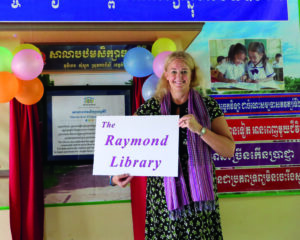Brooke Raymond ’90
 Degrees: B.A. in English; M.L.S. (master of library science), Southern Connecticut State University
Degrees: B.A. in English; M.L.S. (master of library science), Southern Connecticut State University
Job Title: Senior research analyst at the New York Law Institute in New York City
Favorite Trinity Memory: Hanging out with friends on the quad listening to the band The English Beat on someone’s boom box. I learned, laughed, loved, and grew up on campus.
What do you do in your role? The New York Law Institute (NYLI) is the oldest circulating legal collection in New York City. We are a membership law library that has been serving the legal community continuously since 1828—we even provided uninterrupted service during the COVID-19 pandemic. I answer members’ legal research questions together with my colleague on the reference desk. I also evaluate new digital and print resources as well as historic titles as lead on the acquisitions team for possible inclusion in NYLI’s permanent collection.
What do you enjoy most about your work? Finding the “impossible” for our end users (the member law librarians, attorneys, and ultimately their clients), who are always so appreciative!
Would you tell us about your efforts to build a library in Cambodia? I started becoming involved with the New York chapter of Room to Read in May 2013 after reading John Wood’s Leaving Microsoft to Change the World: An Entrepreneur’s Odyssey to Educate the World’s Children and Creating Room to Read: A Story of Hope in the Battle for Global Literacy. These two inspirational books had a profound impact on me. Wood talks about the power and wonder of the human mind and how education and literacy are basic skills that yield the most dramatic impact and positive return on investment available on the planet. The pandemic really forced me to slow down and reevaluate things. I decided I wanted to take my participation in Room to Read to the next level and felt the desire to fund something permanent. I soon joined forces with the New Jersey chapter of Room to Read and fundraised $35,000 for the creation, construction, and outfitting of the Raymond Library —at the Thorm Kiri Primary School in Kampong Speu, Cambodia—with bookshelves, desks, tables, and, of course, books.
Why was this project important to you? This is my legacy. I participated with Literacy Volunteers while at Trinity. If you can read, you can learn anything.
How did your time at Trinity prepare you for your career? Being a student at Trinity reinforced my sense of curiosity and wonder at how much there is to know and, having grown up fairly sheltered, how little I had been exposed to up to that point. I developed the ability to ask pertinent, relevant questions and to think critically through analyzing results and findings. It’s important to push back: Who or what is the source of this information? Are they credible?
Did you have a professor at Trinity who was particularly influential? Professor Barbara Benedict, my adviser, was fascinating. She made 18th-century English literature come alive by placing writings, authors, and characters in historical context. I even had dinner with her and her husband in London during my junior year abroad in France. Trinity professors care about students and can be incredibly influential, helpful, and accessible.
What was the most memorable course you took at Trinity? That would have to be “Othello” during the spring semester of senior year. Professor Milla Riggio and visiting actor Charles Keating helped us stage a full reading, with many memorized passages, of Shakespeare’s Othello. It was an incredible experience to watch the play come to life and to enter into that dark psychology of jealously, paranoia, alleged cuckoldry, and revenge.
Did you have any other formative experiences as a student at Trinity? Serving as the Austin Arts Center publicist for a semester allowed me to see wonderful performances, work with the artists’ publicists, and write advance articles in The Trinity Tripod to encourage student attendance. I also studied abroad via a partner program with Davidson College in Montpellier, France. I had a friend there, a Ph.D. student in economics, who originally hailed from Morocco. We visited his family during Ramadan. My friend’s mother was of Berber descent, and his father was a factory worker who could not read or write. I’ll never forget that. Being able to experience such a different world at a young age allowed me to develop a broader, more liberal perspective that influences me to this day.
